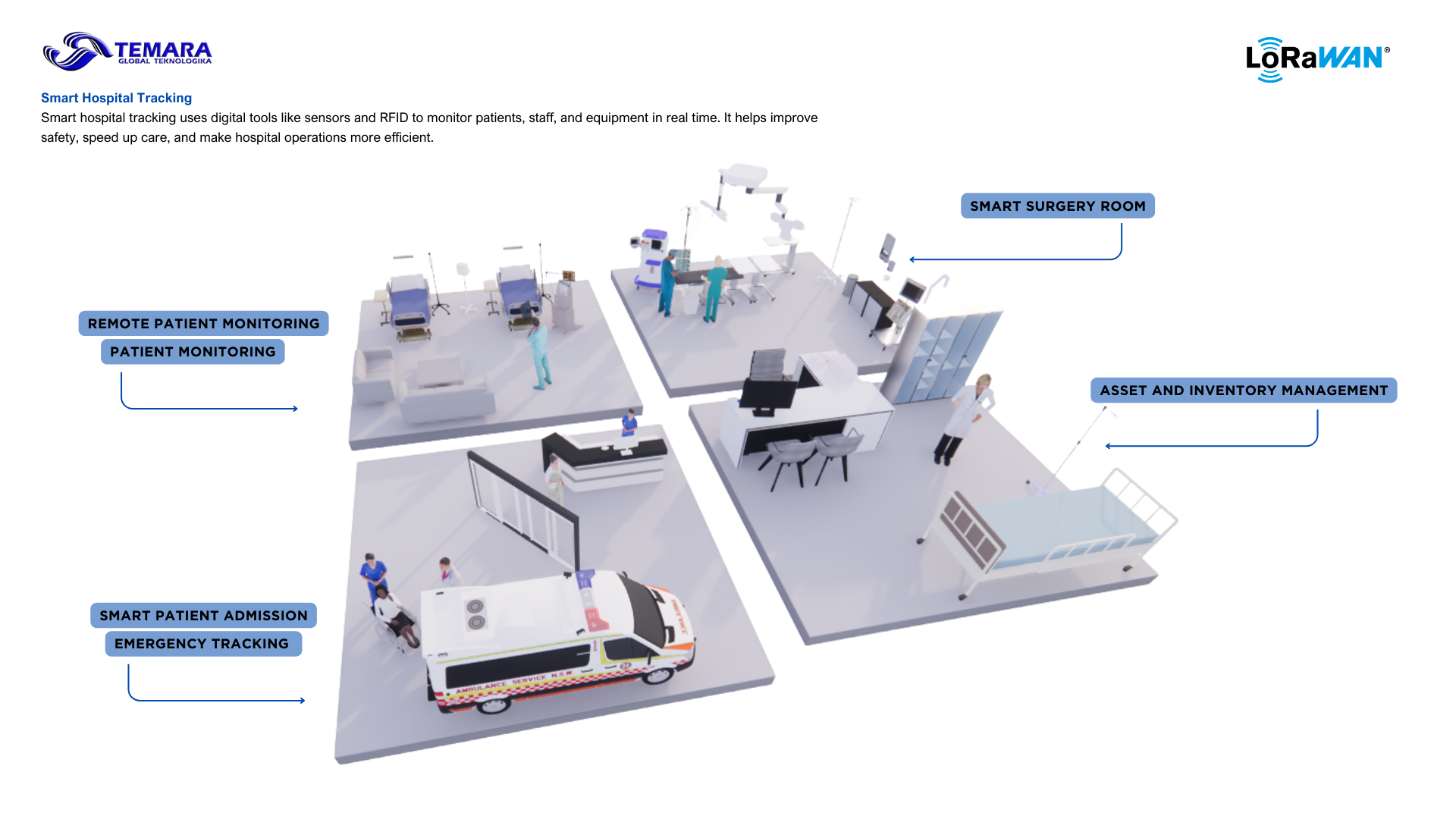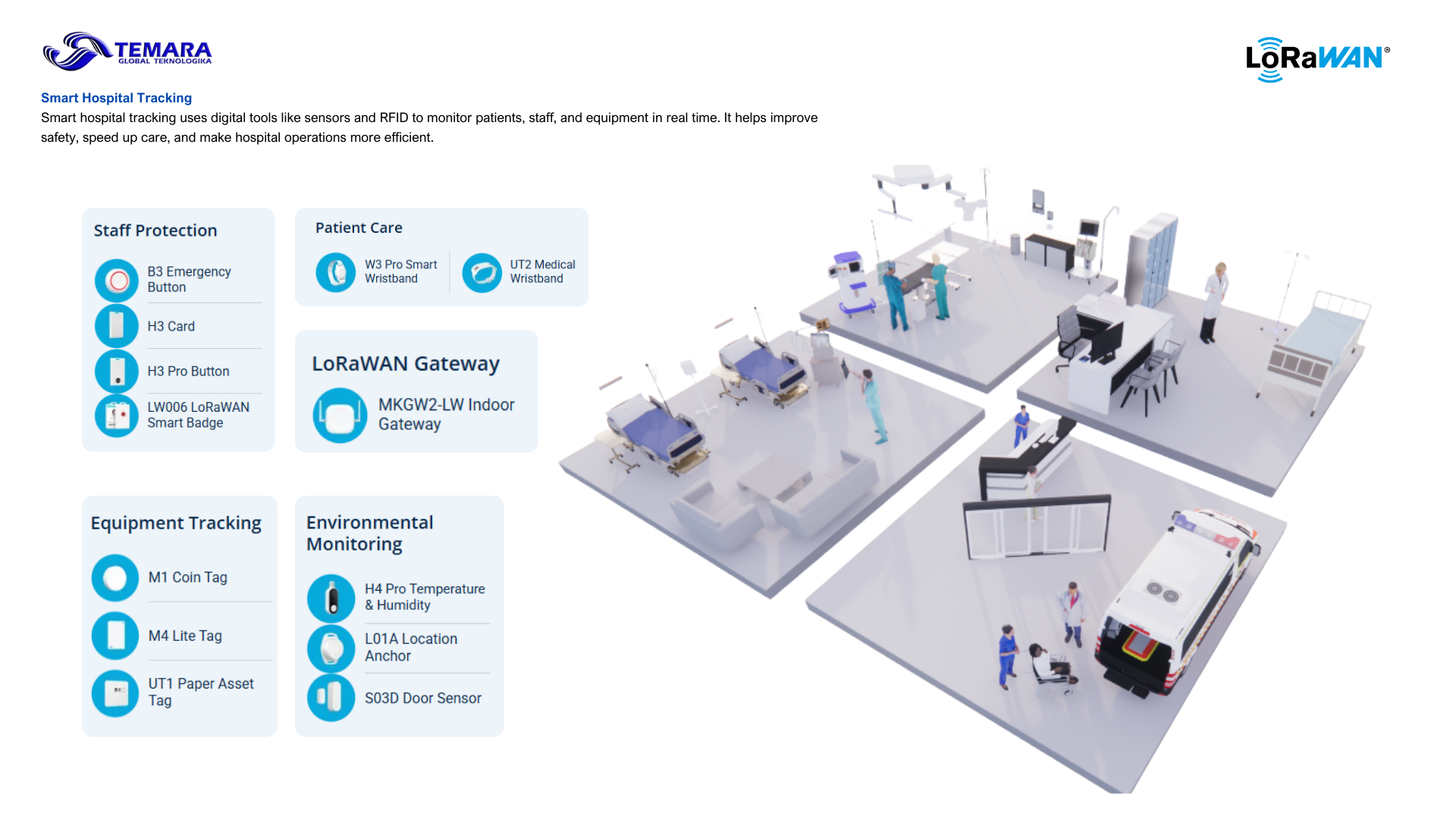In the digital era, the concept of smart hospitals is evolving and becoming an innovative solution to enhance efficiency, patient care, and operational management. Smart hospitals integrate IoT (Internet of Things) technology, automation systems, and artificial intelligence (AI) to create a more intelligent, patient-centric, and resource-efficient healthcare environment.
Advantages of Smart Hospitals
-
Advanced Patient Monitoring Smart hospitals utilize IoT-enabled devices to continuously monitor patients' vital signs, allowing real-time data analysis and early detection of potential health issues.
-
Efficient Resource Management Automated systems optimize hospital resources, including staff allocation, equipment usage, and bed availability, ensuring better service delivery.
-
Enhanced Security and Privacy AI-powered security systems, biometric access control, and encrypted patient records provide robust protection for both patients and medical staff.
-
Remote and Telemedicine Services Integration of telemedicine platforms allows remote consultations, reducing the need for physical visits and improving accessibility to healthcare services.
Implementation of Smart Hospitals in Various Areas
-
Emergency Care: Real-time monitoring and predictive analytics help emergency teams provide faster and more effective treatment.
-
Surgical Procedures: AI-assisted robotic surgery enhances precision and reduces recovery times.
-
Pharmacy Automation: Smart inventory systems ensure accurate medication dispensing and stock management.
-
Patient Experience: Personalized treatment plans and automated appointment scheduling improve overall patient satisfaction.
The Future of Smart Hospitals
With continuous technological advancements, smart hospitals will increasingly become the standard in modern healthcare. Integration with artificial intelligence, big data analytics, and robotic automation will revolutionize patient care, leading to more efficient and effective medical services. Smart hospitals not only enhance patient safety and operational efficiency but also contribute to a more sustainable healthcare ecosystem.
The adoption of smart hospitals is a crucial step in shaping the future of healthcare, making medical services more accessible, efficient, and patient-centered.
In the digital era, the concept of smart hospitals is evolving and becoming an innovative solution to enhance efficiency, patient care, and operational management. Smart hospitals integrate IoT (Internet of Things) technology, automation systems, and artificial intelligence (AI) to create a more intelligent, patient-centric, and resource-efficient healthcare environment.
Advantages of Smart Hospitals
-
Advanced Patient Monitoring Smart hospitals utilize IoT-enabled devices to continuously monitor patients' vital signs, allowing real-time data analysis and early detection of potential health issues.
-
Efficient Resource Management Automated systems optimize hospital resources, including staff allocation, equipment usage, and bed availability, ensuring better service delivery.
-
Enhanced Security and Privacy AI-powered security systems, biometric access control, and encrypted patient records provide robust protection for both patients and medical staff.
-
Remote and Telemedicine Services Integration of telemedicine platforms allows remote consultations, reducing the need for physical visits and improving accessibility to healthcare services.
Implementation of Smart Hospitals in Various Areas
-
Emergency Care: Real-time monitoring and predictive analytics help emergency teams provide faster and more effective treatment.
-
Surgical Procedures: AI-assisted robotic surgery enhances precision and reduces recovery times.
-
Pharmacy Automation: Smart inventory systems ensure accurate medication dispensing and stock management.
-
Patient Experience: Personalized treatment plans and automated appointment scheduling improve overall patient satisfaction.
The Future of Smart Hospitals
With continuous technological advancements, smart hospitals will increasingly become the standard in modern healthcare. Integration with artificial intelligence, big data analytics, and robotic automation will revolutionize patient care, leading to more efficient and effective medical services. Smart hospitals not only enhance patient safety and operational efficiency but also contribute to a more sustainable healthcare ecosystem.
The adoption of smart hospitals is a crucial step in shaping the future of healthcare, making medical services more accessible, efficient, and patient-centered.

